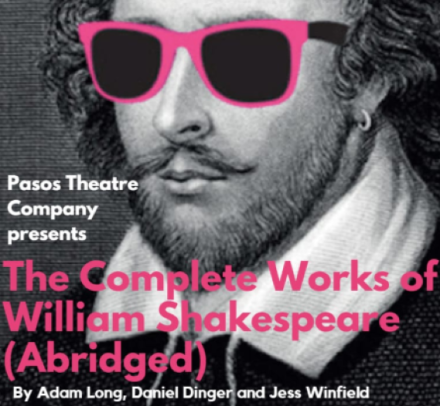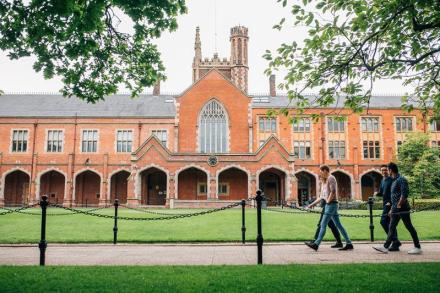Hamnet, as the play’s programme informs us, is just one letter away from greatness. It’s a predicament that haunts the play’s central character, Hamnet Shakespeare, who is based on the real-life son of William Shakespeare. In the play, Hamnet is close to great things – his father, literary fame, knowledge, life, death – but is tragically trapped on their margins. In one hour and with just two actors, Hamnet plucks its titular hero from the side-lines and makes him the centre of attention to tell his story.
From his opening lines as the eleven-year old Hamnet, Ollie West arrests the audience’s attention and never lets go. As a ghost and in asking the audience “Who’s there?”, before telling us “I’m not allowed to talk to strangers”, Hamnet recalls the opening of Hamlet and indicates that fourth-wall breaking will be par for the course. The audience will be both spectators to and participants in Hamnet’s working through of some big and very personal questions – What makes a man great? Why do we suffer? Why do we make art? Why would you choose “not to be”? Are some people born bad? When they’ve never really lived, why do children die? Does his father prefer him or Hamlet? Why did they see so little of one another? It is remarkable that in spite of the gravity of these questions and of Hamnet’s situation, the play is packed with comedy. For instance, Hamnet’s youth is highlighted as he energetically knocks out a Johnny Cash tune on his keyboard, gives a new friend tips on how best to play dead (the key is to stay still and not breathe – wannabe actors take note!), and stuck for answers he pulls out his phone to ask Google. As the play’s authors have crafted a fine balance between tragedy and comedy, West has plenty to work with and he ably shifts between the tones and the media (stage and film) of this production – no small feat for any actor, never mind a pre-teen boy.

Hamnet sees himself on the video – Image credit: DeadCentre.org
Exploring the performative and critical history of Hamlet, David Bevington observes that the play “has now evolved into a cultural expression of what we as a society have become today” (Murder Most Foul, 2011: vii). Like its more famous ancestor then, Hamnet tackles not only existential questions, it seeks in part to express and examine the state of contemporary society (“to hold, as ’twere, the mirror up to nature” [Hamlet, 3.2]). Hamnet and his father Will are trotted out for our entertainment, but the play frequently forces the audience’s gaze back on itself. This is achieved both literally through the backdrop of a live video that shows the theatre and metaphorically as the play pokes at the suppurating wounds in modern life. Hamnet’s targets are near universal and many hit close to home; the ongoing refugee crisis in Europe, Donald Trump’s presidency, celebrity culture, the double-edge sword that is technology, and child-rearing practices (including the Work/Life balance which is an ideal but more often another source of guilt for the working parent), all fall within the bounds of the characters’ discussions.

Hamnet faces the video screen – Image credit: DeadCentre.org
Throughout, Hamnet offers several opportunities to play “spot the reference”. Hamnet’s speeches are peppered with Shakespearean quotations and allusions and at other times the play lifts wholesale from the canon. Hamlet is the key source, but we also hear most of Constance’s “Grief fills the room up of my absent child” speech from King John; as Hamnet misses his sister there are echoes of the separated twins of Twelfth Night and Comedy of Errors; Falstaff and Hal’s play acting in Henry IV Part 1 springs to mind when Hamnet plays at being Hamlet meeting Old Hamlet; and there are touches of Act 5 of Antony and Cleopatra when Hamnet worries whether in the future some actor will play him on stage, but botch the job.
The play is more than a tapestry of Shakespearean references though, and even as it draws on Stoppard’s Rosencrantz and Guildenstern Are Dead and Beckett’s Waiting for Godot, it is something fresh, original, and striking. In the days since I have seen Hamnet, I’ve thought about it again and again – it is a prismatic work, turning the play over in my mind I keep seeing new facets, questions, and ideas – and I’m only certain of one thing: I want to see it again.
—
Hamnet is a Dead Centre and Abbey Theatre co-production and is written by Ben Kidd and Bush Moukarzel, with William Shakespeare. Cast and production details here.
Hamnet runs as part of the Dublin Theatre Festival until 7th October – tickets here – before touring to Europe and Asia. There will be a Post-Show Discussion on Thursday 5th October, with members of the company.








